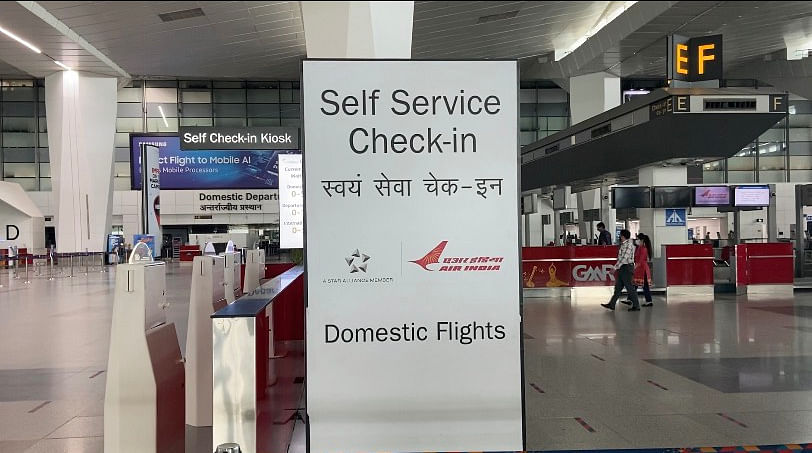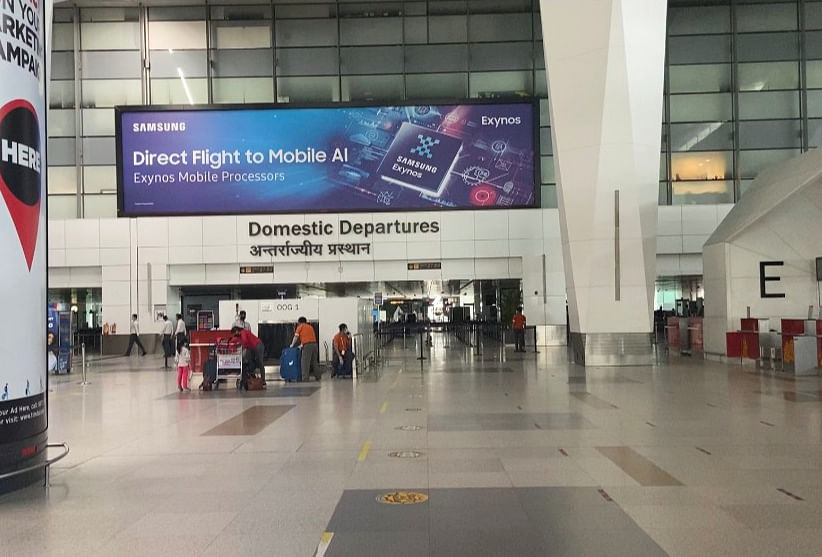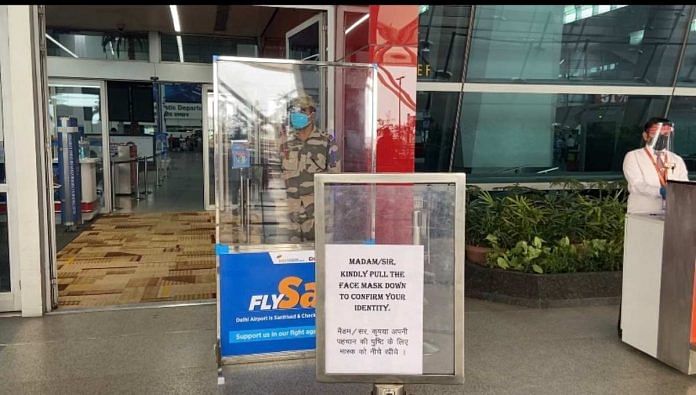New Delhi: India is set to resume domestic air operations Monday, nearly two months after they were shut down in light of the Covid-19 lockdown. But with the pandemic nowhere close to receding just yet, the airport experience is set to undergo a massive overhaul.
ThePrint visited the Indira Gandhi International Airport in Delhi to learn about the changes underway to make flying a safe experience amid the virus threat. And there are quite a few.
You will have to arrive at the airport two hours before departure, preferably after having checked-in online. Only one piece of check-in luggage will be allowed. There is an ultraviolet scanner on the premises to decontaminate your luggage, and a mat at the airport entrance to disinfect your shoes. The security check will be a largely contact-less experience. You are likely to find food kiosks open, but it’s not known yet if the bookshops that ease your airport waiting time will reopen just yet.
Speaking to ThePrint, a senior officer of the Central Industrial Security Force (CISF), which oversees airport security operations, said they had been in action since the Vande Bharat Mission to repatriate stranded Indians began. However, most of the safety protocols were put in place after Union Civil Aviation Minister Hardeep Singh Puri, on 20 May, announced the resumption of air travel, the officer added.
Domestic civil aviation operations will recommence in a calibrated manner from Monday 25th May 2020.
All airports & air carriers are being informed to be ready for operations from 25th May.
SOPs for passenger movement are also being separately issued by @MoCA_GoI.
— Hardeep Singh Puri (@HardeepSPuri) May 20, 2020
Even during the lockdown, a second senior CISF security officer said, a minimal staff stayed deployed at the airport to ensure the systems keep in place.
Also Read: Air travel is the safest mode of transport in Covid times. India can boom here
The new normal
The changes that have kicked in become evident right as you drive into the road outside the departure gates of IGI Terminal 3.
The trolleys that are usually lined up for passenger luggage are noticeably fewer in number. This, the first of two CISF officers quoted above explained, is meant to ensure minimal surface contact.
“We are counting on people to carry their own luggage,” the officer said, adding that passengers must wear masks.
While the ministry has emphasised that passengers need to check in online before they arrive at the airport, the premises have been equipped with an emergency alternative for those who are unable to — an automated self-check-in kiosk right outside each of the gates.
Those who have checked in online can print their boarding passes at the kiosks, which will also dispense baggage tags. The tags were earlier given to passengers at the check-in counter. The kiosks are also present inside.

The entire floor has tape markings to ensure queues adhere to social-distancing guidelines, and passengers need to cross two stages before they are allowed to enter the airport.

The first is a baggage screening counter, equipped with ultraviolet rays to kill any germs on the luggage. Then, passengers have to get their temperature checked. It is only if they are cleared at this stage that they will be allowed to present their ticket at the gates.
This won’t be the same either. The CISF security personnel who check tickets will stand behind a glass shield. Once passengers have presented their tickets and identity proof, they will have to take a step back and remove their masks so that the personnel can verify their identity.
While the civil aviation ministry has said passengers won’t be required to download the Aarogya Setu app, the government portal that alerts one about Covid-19 cases in the vicinity, the first CISF officer said it will be mandatory.
Also Read: International air travel slowly returns as countries partner up, set up ‘bubble’ corridors
Inside the airport
Just as you enter the airport, there is a floor mat sprayed with disinfectant, which is meant to prevent germs from entering the airport. “The mat is meant to absorb all the germs from people’s shoes to ensure complete hygiene,” the second officer said.
Like the outside area, the entire floor of the domestic departure hall is laden with markings to ensure social distancing. As an additional measure, public announcements continuously ask people to maintain a distance and stay safe.
“We have the entire floor marked, security personnel deployed, public announcements and even signboards to ensure social distancing is adhered to at all times,” said the second senior CISF security officer.
Food kiosks will be open at all times, also with social-distancing markers. They will all also have hand sanitisers, as will the airport at large. Moving forward, the check-in counter has been reduced to a mere baggage drop with no contact. Passengers have to fix the baggage tags on the luggage and drop it on the short conveyor belts beside the counters for further processing. The counter, however, will have staff for assistance, all wearing masks and face shields for safety.
“We are also contemplating putting a glass shield like there is outside the airport for the check-in counter,” said the first CISF officer.
There are changes to the security check too. All passengers will be made to stand at a metre’s distance for the security pat-down, which will be conducted with a handheld screening device, without any contact. In case someone needs to be checked further, a security staffer wearing personal protective equipment (PPE) gear will be called in to pat down the passenger.
In the waiting area, passengers will have to sit in alternate seats. The bus that takes passengers to the aircraft will only carry 20 at a time, as opposed to the 50-70 ferried usually.
Food will not be served in the aircraft, but people will be permitted to carry their own.
Hygiene maintenance
According to a white paper prepared by the airport on the changes, accessed by ThePrint, a team of 500 professionals has been deployed to disinfect the airport hourly.
Washrooms will be shut every hour for sanitisation, and all surfaces such as chairs, elevators, railings, and trollies will also be regularly sanitised.
“We also have hand sanitisers present almost everywhere in the airport for passengers,” said the second senior CISF officer.
Functioning at full strength, the Central Industrial Security Force officers said they were prepared for domestic air travel to begin. “We are expecting the first week to be the most hectic as there will be many people who are away from their homes returning to their families,” said the second officer.
Also Read: Air travel is gradually returning, but coronavirus complications remain




Thanks for the update on restarting of domestic air flights.